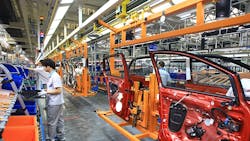China's Subdued Domestic Demand Stalling Manufacturing Growth
BEIJING -- Chinese manufacturing growth stalled in September, data showed Wednesday, as a sluggish property market complicates leaders' attempts to address a slowdown in the world's second-largest economy.
The official purchasing managers index (PMI) came in at 51.1 in September, unchanged from the previous month, the National Bureau of Statistics said.
While it was above the 50-point mark that separates growth and contraction, it comes a day after HSBC's own PMI missed forecasts, and analysts said authorities will likely use the gauges to adjust policy.
The index tracks activity in China's factories and workshops and is a closely-watched indicator of the health of the economy.
Beijing's official PMI for July came in at 51.7, which was an increase from June's 51.0.
ANZ Bank economists Liu Li-Gang, Zhou Hao and Louis Lam said that the latest PMI readings "suggest that there is little improvement in growth momentum."
"In our view, the current crackdown on shadow banking activities, continued weakness in the property market and rising credit risks in the commodity sector will continue to weigh on the economy," they said.
"However, the Chinese authorities will remain proactive to arrest the slowing momentum," they added, citing a move by the central bank Tuesday to relax property policies.
Julian Evans-Pritchard, China economist at Capital Economics, said that while foreign demand has held up, the latest figure indicates domestic demand remains "subdued" and that "the cooling property sector continues to be a drag."
"As such, our base scenario remains a gradual slowdown in economic activity in coming months," he said.
On Tuesday HSBC said its September PMI came in at 50.2, the same as August but lower than a preliminary reading of 50.5. The bank's July figure was 51.7.
China's economy grew a stronger-than-expected 7.5% in the second quarter, up from 7.4% in the previous three months, which was the worst since a similar 7.4% expansion in July-September 2012.
Authorities have introduced a string of measures to try to boost growth since April, including targeted infrastructure spending, small business tax breaks and incentives to spur lending in rural areas and to small companies.
But with indicators in August pointing to slowing industrial production, retail sales and fixed asset investment, economists have intensified calls for further measures.
A slowdown in China's huge property sector is also weighing on overall growth, with economists worrying that a potential destructive bust in prices could dent impact the economic powerhouse, a key driver of global and regional growth.
An independent survey of China's housing prices showed the fourth month-on-month fall in a row in August, although the decline was slower than July's as more local governments loosened purchasing restrictions to boost sales.
The average price of a new home in 100 major cities was 10,771 yuan (US$1,752) per square meter last month, down 0.59% from July, the China Index Academy said.
China is scheduled to announce third-quarter gross domestic product figures on October 21.
Copyright Agence France-Presse, 2014
About the Author
Agence France-Presse
Copyright Agence France-Presse, 2002-2025. AFP text, photos, graphics and logos shall not be reproduced, published, broadcast, rewritten for broadcast or publication or redistributed directly or indirectly in any medium. AFP shall not be held liable for any delays, inaccuracies, errors or omissions in any AFP content, or for any actions taken in consequence.
